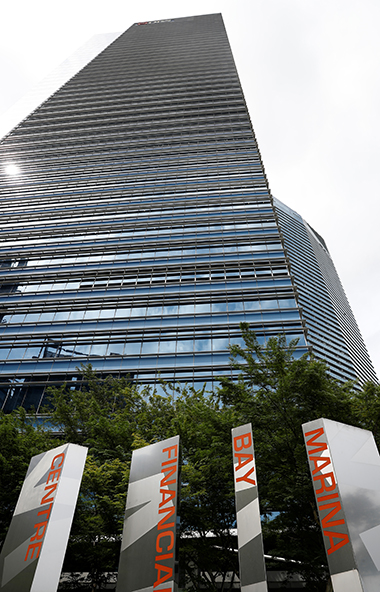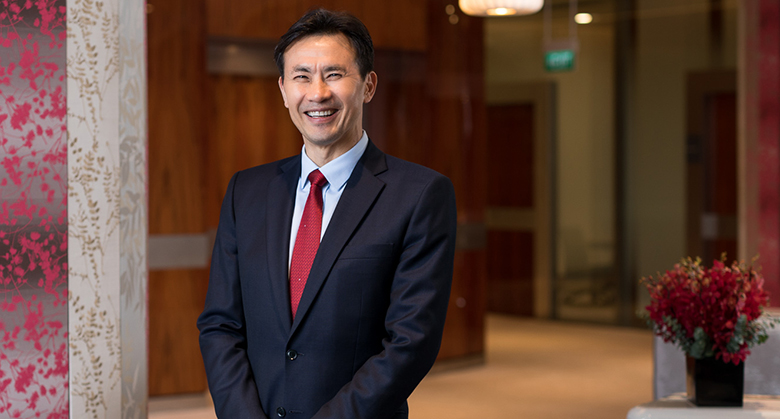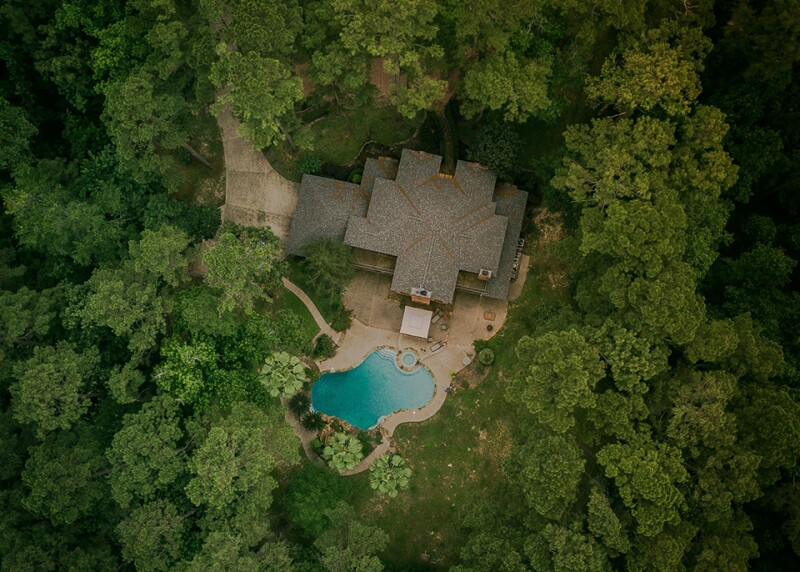Joseph Poon’s world was tipped upside down on April 30, 1975. It was the day his hometown of Saigon fell and was renamed Ho Chi Minh City. The day US forces fled Vietnam, bringing an end to a conflict still locally known as the American War.
A comfortable way of life came, Poon says, to an “abrupt and cataclysmic” end. Food was rationed; a ticket was needed to buy a cup of rice. At school, North Vietnam’s victorious forces replaced facts with communist dogma. Branded bourgeoisie, the family was subject to a “constant and palpable threat of persecution”.
I left Asia abruptly at a young age, but Asia has never left me
But within two years, they were out. One afternoon after school, Joseph and his siblings – five sisters and a younger brother – hurried to a boat his father had spent a year quietly building. “When we left, we had no idea where we were going, if we would be able to evade the pirates who were preying on refugee boats,” he says.
The fragile cargo washed ashore in Malaysia, where they spent seven months in a camp surrounded by people smugglers. When an offer of resettlement came, the Poons grabbed it. They got lucky. Of the 700,000 Vietnamese ‘boat people’ who fled the country, they were one of a handful that wound up in peaceful New Zealand.
Slowly, they rebuilt their world.
Ringside seat
These days, Joseph Poon is group head of DBS Private Bank in Singapore. He’s very well dressed, which you expect from someone at the top of the tree in wealth management. But he smiles a lot more than many of his peers – a beaming grin that makes his face light up.

Visually, his life could not be more different from the one he fled 43 years ago. Yet his corner office at 12 Marina Boulevard in Singapore offers a ringside seat to many of the crises and conflicts unfolding in the world today. He isn’t sitting in a crate in the South China Sea – but others are out there right now, risking their lives to cross the Mediterranean Sea or the English Channel in search of a better life.
Those early experiences made him if not embrace, then at least accept “the uncertainties in life” and the “changes that can never be predicted.” He likes quoting former US defence secretary Donald Rumsfeld’s epithet of the world being full of stuff we can touch and see but also riddled with ‘unknown unknowns’ – all the things we don’t know we don’t know.
That acceptance of the world as a place where fate plays with you, has framed and defined his career. Private banking may not seem an innately chaotic experience, but it is in that it serves wealth that must react swiftly and consciously to ripples in the financial landscape. Some of these are small, others, like Covid, have major ramifications. A few – such as the growing rift between the US and China – could forever affect how goods and services are made and paid for.
Repositioning
Poon points to the number of high and ultra-high net-worth families “repositioning themselves not just [away] from greater China but also from Europe and, believe it or not, the US too. We are seeing higher flows of capital from all three regions into Singapore, from new clients as well as existing clients.”
He’s not alone in framing southeast Asia as a great investment opportunity, with Singapore at the heart of that story.
Until recently, the Asean region was seen as one of the great unrealized investment opportunities. When the Asian financial crisis rolled through Thailand and Malaysia in 1997, a lot of western money fled to Silicon Valley to fund the dot.com boom.
Much of it never came back.
Yet increasingly it feels like a place of the future, not the past. Firms are moving supply chains from China to the likes of Vietnam and Indonesia where salaries are lower. If, as seems likely if not certain, the US and China do decouple, that process will accelerate.
Two or three years ago, greater China was the focus for European and US investors. Increasingly, it is Asean
“Two or three years ago, greater China was the focus for European and US investors,” Poon says. “Increasingly, it is Asean.” The region is “a much more important focus for them and they want to be well positioned to invest” in it.
Singapore’s stability and neutrality are highly attractive qualities for the world’s wealthiest families.
In August 2020, Spencer Hsu, deputy director of the Monetary Authority of Singapore, said the number of family offices based in the city rose five-fold between 2017 and 2019.
In March 2020, Shu Ping, a Sichuan-born billionaire who owns the world’s largest chain of hotpot restaurants, opened her first family office in Singapore. Last year, the inventor James Dyson moved Weybourne Group, his family office, there from the UK.
Hong Kong’s loss over the past 18 months appears to be Singapore’s gain, following prolonged riots in the former British colony, and the imposition by Beijing this June of a strict new security law.
The southward migration of wealth from Hong Kong seems to be speeding up. “We have strong franchises in Hong Kong and Singapore, and we do see clients starting to position themselves across both jurisdictions but more so in Singapore,” says Poon.
Instability
Whether consciously or not, wealthy families, aided by financial advisers, are actively adapting to a world riven by pandemics and political instability.
Poon points to the amount of cash being held by wealthy investors. “Clients on average hold 20% of their portfolio in cash,” he says. “But in the last few months, around 40% of our portfolios – much of which came from net new money – has been in cash. There is a huge amount of dry powder on the sidelines.”
This is partly because business owners want to stay liquid so they can use that cash to support a business or asset if it gets into trouble. But it’s also because Covid will, sooner or later, offer up some choice investments.
Over the next six to 12 months, we believe opportunities will emerge, given there are zombie companies out there
He points to wealthy families “looking for ways to invest in rising technology firms” in Indonesia and Thailand, countries with some so-so banks but lots of young people embracing e-commerce and new digital payments apps. “We are kicking a lot of tyres, seeing where they should invest,” he says.
European family offices meanwhile are eyeing distressed assets. “Over the next six to 12 months, we believe opportunities will emerge, given there are zombie companies out there.”
Journey
Before long, talk returns to Poon’s heritage and history, and how it continues to affect his life. Those formative moments – a happy life disrupted and destroyed overnight – “taught me there are changes that can never be predicted,” he says.
A stoic acceptance of all the unknowns, good and bad, lying in wait, plays “a large role in how I help clients,” he adds. “I believe wealth management is fundamentally a never-ending journey of risk management.”
Money matters to him too. The fortune his family left behind in Vietnam was, he says, small but important. He remembers seeing the communists crush the south’s currency by replacing one old dong with 500 ‘liberation’ dong. “When you look at things that way, you learn never to put all your eggs in one basket.”
I believe wealth management is fundamentally a never-ending journey of risk management
Growing up in New Zealand was great, but over time, the desire to get closer to his roots only grew. After graduating from the University of Wellington, he worked in wealth management for Macquarie, Julius Baer and UBS, before pitching up at DBS in 2016.
“I left Asia abruptly at a young age, but Asia has never left me,” he says. “I was drawn back to the region in 1992, to rekindle my Asian roots. A planned three to five-year tenure in Singapore is still going strong after 28 years. Wealth creation in Asia has been spectacular over this period and helping clients to navigate an increasingly complex world… has never been more challenging and rewarding.”
That’s why sustainable finance means so much to him – and to a bank that approved more than $3.6 billion in sustainability-linked loans in 2019.
Challenges
He points to challenges that will linger long beyond Covid; at families struggling just to feed, clothe and educate themselves; and to the good the wealthy can do for society. He helps rich people to maximize financial returns, but he adds that humanity and morals also mean “doing good while doing well.”
Where does he advise his clients to invest? Poon points to three paths to follow.
First, he says: “I ask our clients to create resiliency in their planning.” That means setting aside enough to maintain the family’s lifestyle for “at least the next one to two years”. Liquid assets may not generate hefty returns, but they offer peace of mind in tough times.
Second, diversify and do it well. Scatter wealth across asset classes and currencies, and invest in securities with a mix of maturities. He urges business owners not to plough money into their own industry. It’s tempting to invest in what you know, but it avoids a “double whammy when [your] industry faces unexpected systemic risks”.
“Finally,” he adds, “clients should look to invest in opportunities with a compelling long-term investment case.”
That can mean putting seed capital to work in good young technology firms, buying securities issued by corporates that continue to pay generous dividends and investing in the best environmental, social and governance (ESG) funds. Poon points to an ESG structured product launched by DBS in 2018 that has clocked an average return, as of August 15, of 10.03%.
You wouldn’t know his back story just by meeting him. Poon has come to terms with life, he knows he must always be “prepared and mentally strong” to deal with every challenge – both the things we see and the unknowns we can’t.
It certainly helps if you do so with a big smile on your face.




